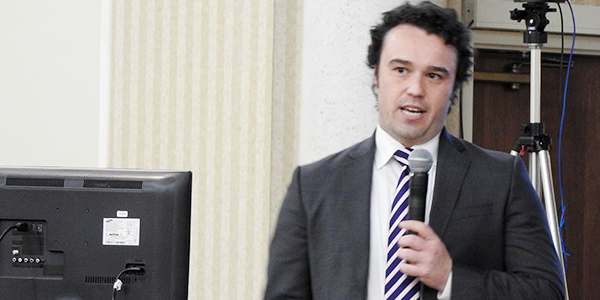By Christen Smith and Rich Heidorn Jr.
WILMINGTON, Del. — PJM stakeholders appear ready and willing to explore carbon pricing in the RTO — a prospect that concerns utilities in coal-heavy states.
Michael Borgatti of Gabel Associates presented a first read of a problem statement and issue charge at the Markets and Reliability Committee meeting Thursday that would task stakeholders with creating rules to address carbon leakage and help states meet greenhouse gas reduction policies. Borgatti made the presentation on behalf of the Independent Energy Producers of New Jersey, which includes NextEra Energy and PSEG Power.
“Acknowledging the reality that some folks are pursuing these policies and others aren’t is not an indictment or an endorsement of either of those positions,” he said. “The conversation is being had whether we want to or not. We are not policymakers here. What we should do is consider options to make sure pricing reflects the difference between [those] pursuing these policies and those that are not.”
Many stakeholders expressed support for the initiative and said they looked forward to engaging in the process. Borgatti said he expected the initiative would take one to two years to consider policy changes.
“It’s one of those discussions that are in the hallways and the back of the room,” said Greg Poulos, executive director of the Consumer Advocates of PJM States. He said he supported the initiative, “so we can have a discussion in the front of the room.”
Gary Greiner of Public Service Electric and Gas also expressed support. “We agree it’s the right time to be in this, with [the Regional Greenhouse Gas Initiative] showing its head in New Jersey and Virginia.
In December, New Jersey Gov. Phil Murphy’s administration proposed rules to rejoin RGGI, which the state left in 2012 under Gov. Chris Christie. One proposal would set the state’s initial carbon dioxide cap for electric generation at 18 million tons in 2020 — when the return would be effective — declining by 3% annually through 2030. A second proposed rule concerns how the state would spend proceeds from the CO2 allowance auctions. The comment period on the proposals closed Feb. 15.
Earlier this month, Virginia Gov. Ralph Northam vetoed legislation that would have prevented his state from joining RGGI. Northam is pushing for the state to join the pact next year.
Only two PJM states, Delaware and Maryland, are currently RGGI members.
The problem statement refers to leakage concerns — changes to generator dispatch decisions that occur when energy offers from some resources reflect the cost of carbon while others do not. In addition to RGGI, it noted that New York and Canada are implementing carbon pricing.
Load interests expressed concern over the complexity and impact of carbon pricing given the diversity of climate policies in the 13-state RTO’s footprint.
“This is such a tricky issue because I think there are chicken-and-egg-type problems associated with it,” said Susan Bruce, representing the PJM Industrial Customer Coalition. “One concern right now … with the amount of change that’s occurring, we don’t know what we don’t know at this point in time, and that’s layering on an additional level of uncertainty.”
Carl Johnson of the PJM Public Power Coalition said the language in the problem statement suggests there’s already a solution for the issue.
“If the carbon price is zero and you don’t have leakage, then you don’t have to do anything,” he said. “If we are talking about just leakage, then I think we are fine. But if we start considering other issues, like resource adequacy, I can understand the hesitancy from nonparticipating states.”
American Electric Power’s Dana Horton noted that his company has many coal-fired generators and serves states that have not adopted aggressive climate policies. “We’re … concerned about what this might do to our customer base and their costs,” he said. “We have lots of reservations.”
Borgatti responded that the initiative is intended to ensure appropriate pricing in states with and without climate policies. “We’re talking about creating an option that the states don’t have today,” he said.
PJM’s Stu Bresler called the problem statement and issue charge “fortuitous.” The RTO issued a white paper in 2017 that explored ways to implement carbon pricing on a regional or subregional basis.
“I feel like the problem statement and issue charge is an ideal forum for feedback for what we can work into our process,” he said. “We support engaging stakeholders in this discussion because we were going to do this anyway.”







